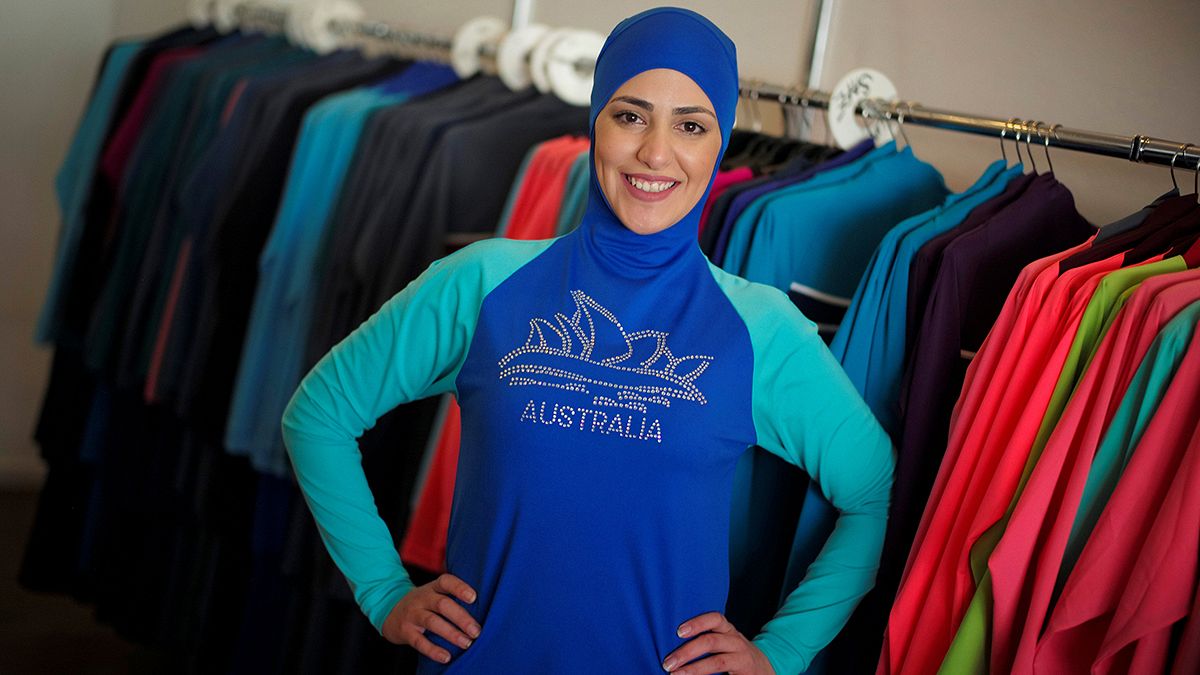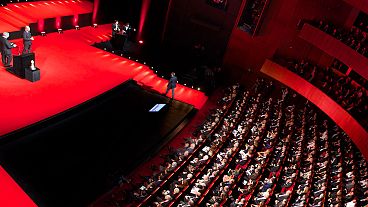The controversy over the body-covering swimwear for Muslim women - the burkini - is creating a business opportunity for its inventor who says orders have jumped.
The controversy over the body-covering swimwear for Muslim women – the burkini – is creating a business boost for its inventor.
More than a dozen French resorts have banned burkinis, which leave only the face, hands and feet exposed, as contravening laws on secularism with Prime Minister Manual Valls saying it’s “not compatible with the values of France”.
French PM Manual Valls backs burkini beach ban but will not legislate for it https://t.co/6JJ6qh0aXwpic.twitter.com/aDT75IvKDC
— euronews (@euronews) August 19, 2016
The designer of the costumes, Aheda Zanetti, said the publicity meant online orders jumped fivefold.
She doesn’t think the garment is going to go away: “Our sales have increased and the more they actually ban it, or the more they actually reject it, it doesn’t mean a woman will ever stop wearing it. I mean, we’ve introduced this new lifestyle to women that never had it. Do you honestly think one man that says one thing like that, that a woman’s going to listen? We’re women, we know what’s best for us.”
Zanetti, who has lived in Australia for more than 40 years since moving there from Lebanon, came up with the design and the name burkini – or burqini – in 2004 after discovering a lack of sporting garments suitable for Muslim women.
She estimates around 40 percent of sales are to non-Muslims, including cancer survivors, body conscious mothers or women who want to protect their skin from the sun.
Jews, Mormons, Buddhist nuns… Over 40% of burkini sales from non-Muslim women, says inventor https://t.co/r3d4W745prpic.twitter.com/Z4DQPeKmIk
— Andrew Stroehlein (@astroehlein) August 24, 2016
“Battle of cultures”
French Prime Minister Manuel Valls defended a ban on burkinis on Thursday, saying France was locked in a “battle of cultures” and that the full-body swimsuit symbolised the enslavement of women.
Photographs of armed police ordering a Muslim woman on a beach in the Mediterranean city of Nice to partially derobe went viral on social media this week, upsetting many French Muslims and causing global consternation.
In a sign of rifts opening in the socialist government before a presidential election in 2017, Najat Vallaud-Belkacem, France’s Moroccan-born education minister, cautioned the debate was fanning racist rhetoric and being used for political gains.
By speaking out against #Burkini ban,
najatvb</a> contradicting her own Prime Minister, Manuel Valls. Principled stance <a href="https://t.co/Yyl9ii95v7">https://t.co/Yyl9ii95v7</a></p>— Imad Mesdoua (ImadMesdoua) August 25, 2016
“We have to wage a determined fight against radical Islam, against these religious symbols which are filtering into public spaces,” Valls said in an interview on BFM-TV.
Reiterating his stance on the issue, he said: “For me the burkini is a symbol of the enslavement of women.”
The debate over the burkini ban encapsulates the difficulties secular France faces as it grapples with a response to homegrown jihadists and foreign militants following Islamist attacks on Nice and a Normandy church in July, with security and immigration now central to the presidential election campaign.
Former head of state Nicolas Sarkozy, who joined the presidential race on Monday, told the Figaro magazine that France under President Francois Hollande had become too timid.
“The Burkini is a political act, a militant act, a provocation. Women who wear it are testing the Republic,” he told the magazine in comments to be published on Friday.
#Rediff Nicolas Sarkozy au Figaro Magazine: «La République a trop reculé» https://t.co/Ywmj5docgcpic.twitter.com/fBjN425y26
— Le Figaro (@Le_Figaro) August 24, 2016
Reaction Europewide
In a demonstration of how the Burkini controversy has reverberated abroad, British author J. K. Rowling tweeted: “So Sarkozy calls the Burkini a ‘provocation’. Whether women cover or uncover their bodies, seems we’re always ‘asking for it.’”
So Sarkozy calls the burkini a 'provocation.' Whether women cover or uncover their bodies, seems we're always, always 'asking for it.'
— J.K. Rowling (@jk_rowling) August 25, 2016
France is not the only country where restrictions on burqas and niqabs are back in the spotlight, and debate on assimilation is raging, after a number of militant attacks in Western Europe and an immigration crisis that has forced a rethink of Europe’s open border policy.
In Germany, Chancellor Angela Merkel’s conservatives want a partial ban on the niqab, or face veil, while in Austria right-wing politicians have called for a ban on the burqa, which covers the face and body. In Switzerland there are calls for a popular vote on a ban on the burqa.
On a visit to Paris on Thursday, London’s Muslim mayor, Sadiq Khan, condemned the ban, saying no one should tell women what to wear.
“I don’t think it’s right,” Khan told the Evening Standard newspaper. “One of the joys of London is that we don’t simply tolerate difference, we respect it, we embrace it.”
Sadiq Khan on the burkini ban: “I don’t think anyone should tell women what they can and can’t wear. Full stop.” https://t.co/eVtvxUBlDT
— POLITICO Europe (@POLITICOEurope) August 25, 2016



